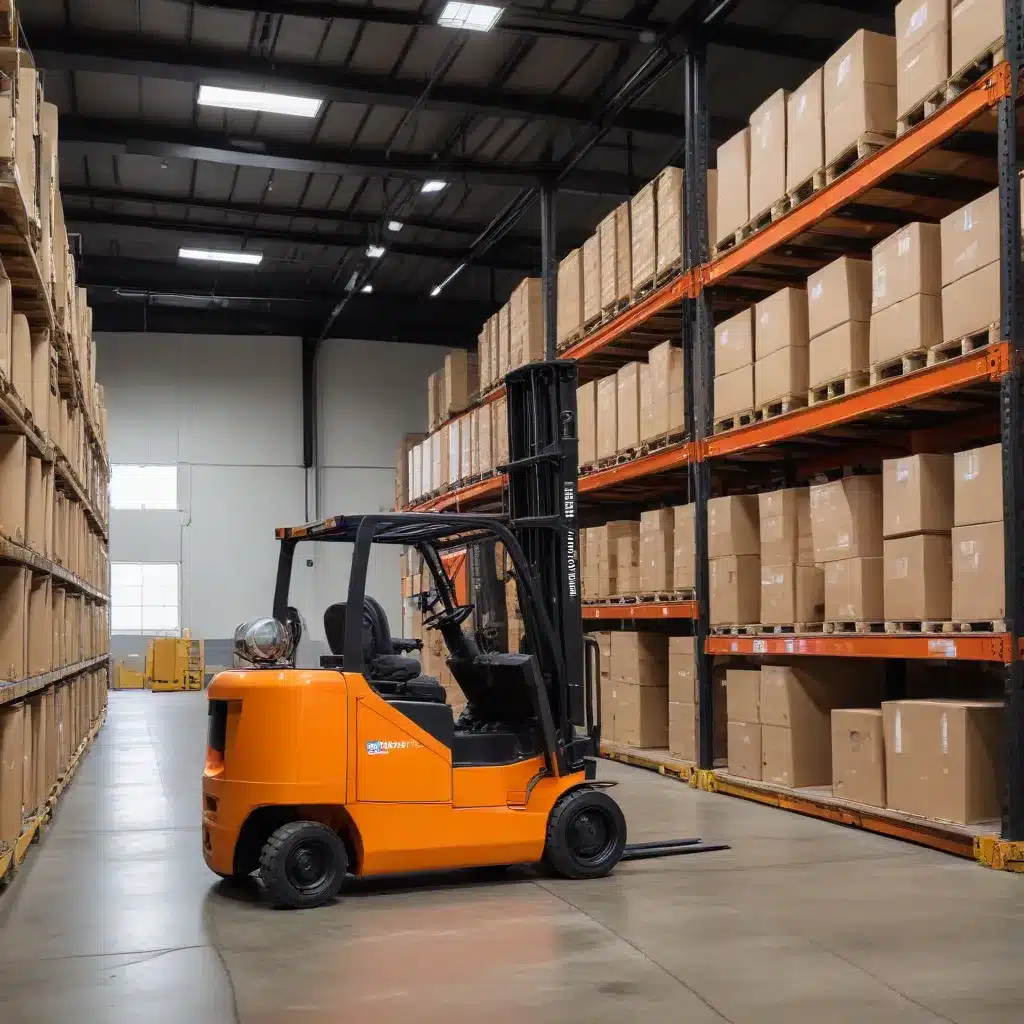
The Rise of Sustainable Material Handling
In the ever-evolving world of logistics and warehousing, sustainability has become a paramount concern. As businesses strive to reduce their environmental impact and embrace greener practices, the material handling industry is experiencing a transformative shift towards electric forklifts. These cutting-edge machines are revolutionizing the way goods are transported and stored, offering a glimpse into the future of warehouse operations.
Overcoming the Limitations of Conventional Forklifts
Traditionally, warehouse fleets have relied on diesel-powered forklifts, which, while robust and reliable, come with a significant drawback: environmental impact. The emissions from these machines can compromise air quality, contribute to greenhouse gas levels, and create a noisy work environment. Additionally, with the UK government enforcing the use of white diesel in forklift trucks starting in 2022, the operational costs of running a diesel-powered fleet have become increasingly prohibitive.
Unlocking the Benefits of Electric Forklifts
The solution lies in the adoption of electric forklifts, which offer a compelling alternative to their fossil-fuel counterparts. These state-of-the-art machines harness the power of electricity, eliminating harmful emissions and significantly reducing the environmental footprint of warehouse operations. With their advanced technology and innovative features, electric forklifts are poised to become the new standard in material handling.
Improved Efficiency and Productivity
One of the primary advantages of electric forklifts is their exceptional efficiency and productivity. These machines boast quick acceleration, smooth maneuverability, and precise control, enabling them to handle a wide range of loads with ease. By streamlining material handling tasks, electric forklifts can significantly enhance overall operational efficiency, reducing downtime and maximizing throughput.
Cost-Effective Operation
Embracing electric forklifts can also lead to substantial cost savings in the long run. With no need for fuel procurement, these machines eliminate the ongoing expenses associated with diesel or gasoline. Furthermore, their advanced battery technology and energy-efficient motors translate to lower energy consumption and reduced maintenance requirements, ultimately contributing to a lower total cost of ownership.
Enhanced Safety and Ergonomics
Safety is a critical consideration in any warehouse environment, and electric forklifts excel in this regard. These machines are equipped with state-of-the-art safety features, such as intelligent monitoring systems and responsive braking, ensuring a secure work environment for operators. Additionally, the reduced noise levels and absence of exhaust fumes create a more comfortable and ergonomic work setting, promoting a healthier and more productive workforce.
Sustainability and Environmental Responsibility
Perhaps the most significant benefit of electric forklifts is their environmental-friendliness. By eliminating direct emissions, these machines contribute to a cleaner, greener warehouse ecosystem. This alignment with sustainability goals not only enhances a company’s reputation but also positions it as a responsible industry leader, resonating with environmentally conscious customers and stakeholders.
Transitioning to an Electric Warehouse Fleet
Recognizing the numerous advantages of electric forklifts, forward-thinking companies are proactively transitioning their warehouse fleets to this innovative technology. One such success story is that of Phoenix Building Systems, a modular and portable construction company based in the UK.
A Case Study: Phoenix Building Systems’ Sustainable Transformation
Committed to building a safe and sustainable business, Phoenix Building Systems partnered with TCM dealer Barek Lift Trucks to explore solutions for optimizing its fleet of four forklift trucks. Recognizing the impending shift towards electric forklifts, the company sought to embrace this technology and future-proof its operations.
Through Barek Lift Trucks’ expertise and on-site demonstrations, Phoenix Building Systems gained confidence in the capabilities of electric forklifts. The company acquired two cutting-edge TCM FHB35 (3.5T) electric counterbalance forklift trucks, which seamlessly integrated into its daily operations. The benefits were immediate, with improved safety features, significant fuel cost savings, and better running costs.
Encouraged by the success of the initial investment, Phoenix Building Systems went on to order additional electric forklifts, including a 5-tonne model, further cementing its commitment to sustainability. The company also installed a solar panel network on the roof of its new building, powering the manufacturing plant and charging the electric forklifts, achieving immediate payback on its investments and making significant strides towards its green energy targets.
Automated Material Handling: The Next Frontier
As the material handling industry continues to evolve, the integration of automation technologies is emerging as the next frontier. Leading manufacturers, such as Linde Material Handling, are at the forefront of this revolution, offering a comprehensive range of automated guided vehicles (AGVs) and autonomous mobile robots (AMRs) to enhance warehouse efficiency and productivity.
Streamlining Operations with Automated Forklifts
Automated forklifts, powered by intelligent navigation and safety systems, are transforming the way goods are transported and stored within warehouse environments. These cutting-edge machines can take over repetitive and tiring tasks, increasing handling volumes and reducing error and accident rates. By seamlessly integrating with existing systems and processes, automated forklifts optimize material flows, improve efficiency, and enhance safety for both operators and the surrounding workforce.
The Rise of Autonomous Mobile Robots
Alongside automated forklifts, the growing prominence of autonomous mobile robots (AMRs) is shaping the future of intralogistics. These driverless platform trucks are designed for automated or partially automated goods transportation, significantly boosting efficiency in warehouses and logistics hubs. AMRs leverage advanced navigation and safety technologies to navigate through confined spaces, coordinate with other automated systems, and respond to dynamic conditions, all while reliably transporting materials.
Embracing the Future of Warehouse Electrification
As businesses strive to align with sustainability goals and enhance operational efficiency, the adoption of electric forklifts and automated material handling solutions is no longer a choice, but a necessity. By embracing these cutting-edge technologies, warehouse operators can future-proof their operations, reduce environmental impact, and gain a competitive edge in an increasingly dynamic industry.
To learn more about the latest advancements in electric forklifts and automated material handling solutions, visit Forklift Reviews. Our team of industry experts is dedicated to providing comprehensive insights, practical tips, and in-depth reviews to guide businesses on their journey towards a more sustainable and efficient future.

